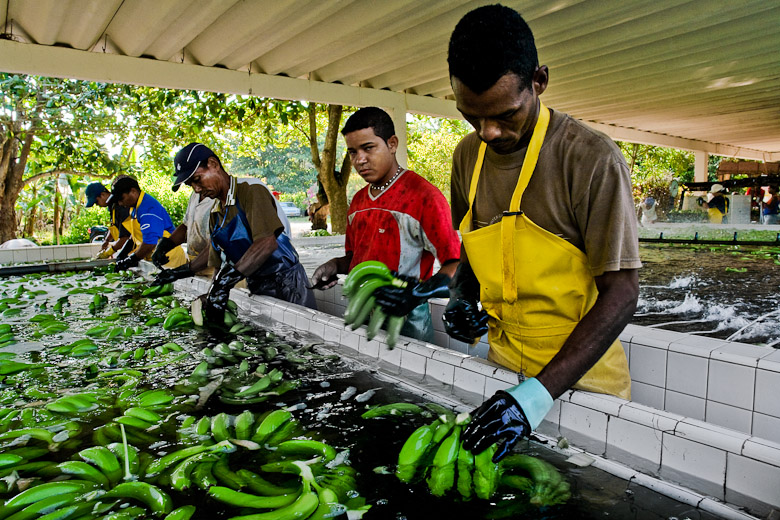Bananas: Geneva Agreement signed, bilaterals cut tariffs further
Bridges Weekly Trade News Digest | 2 June 2010
Bananas: Geneva Agreement signed; bilaterals cut tariffs further

Trade negotiators opened bottles of champagne in Geneva on Monday as they formally signed the Geneva Agreement on Trade in Bananas, thus laying to rest one of the most protracted and bitter disputes in the multilateral trading system’s recent history. However, delegates also acknowledged that the EU’s tariff on bananas from Peru, Colombia and six Central American countries will be slashed still further, following recent bilateral deals with these nations.
The Geneva Agreement on Trade in Bananas cuts the EU’s multilateral banana tariff in gradual steps from €176 per tonne to €114 per tonne by 2017. However, the recent bilateral accords offer preferential treatment to Colombia and Peru, and to Costa Rica, Guatemala, Honduras, El Salvador, Nicaragua and Peru: exports from these countries will face a duty of 75 euros per tonne by 2020, again in a series of incremental reductions.
The multilateral Geneva accord lays to rest decades of conflict between trading powers, with a clause stating that parties agree a truce on any ongoing or future WTO disputes on the matter. “We did actually open a few bottles of champagne after the signing ceremony” acknowledged one delegate.
Because the deal will apply retrospectively from 15 December 2009, the date when the accord was first initialled at WTO headquarters in Geneva, exporters will be able to claim compensation for duties paid at the higher level since last December, trade officials said.
The EU’s newly ratified Lisbon treaty means that the agreement now must be approved by the European Parliament and also the bloc’s Council of Ministers, before returning to the WTO for approval of the new tariff arrangements. Sources familiar with the process suggested that this could take place by early autumn.
“Systemic issues”
The bilateral deals that the EU has recently concluded with Latin American countries raise “systemic issues,” said one negotiator from the group of African, Caribbean and Pacific (ACP) countries that have opposed faster and deeper cuts in the EU banana tariff, on account of the harm it could cause to less competitive producers in these regions that have historically benefited from preferential access to the EU market. “Other countries would also be interested in having a low tariff,” remarked the negotiator.
ACP countries and Latin American countries have been at loggerheads in the Doha Round of trade talks, with the latter group seeking accelerated and deeper cuts for a range of products, and the former seeking the opposite. While an outline accord was reportedly struck by the two groups as part of the resolution of the banana dispute, its details have yet to be made public. “It has been lodged with the chair of the WTO negotiating group, and the Director-General, and it just stays there” until a few outstanding issues are resolved, said one negotiator.
India and Pakistan in particular reportedly have some concerns with the deal that has been reached, said delegates, who indicated that the two nations were still seeking more favourable market access for a number of tariff lines that were of particular interest to them.
Bilateral accords
The bilateral accords provide a mechanism for the EU to increase tariff levels in any given year if a ‘trigger import volume’ is reached — effectively establishing a quota mechanism that will limit the volume of imports entering the EU market.
Ecuador, the world’s biggest banana exporter, is not currently a party to the bilateral accords — although sources speculated that the country might also wish to benefit from the reduced tariff now on offer to its neighbours in the region. Historically, Ecuador has underscored the need for any bilateral deal to cover broader development issues, such as migration, international cooperation and illegal drugs, rather than just focusing more narrowly on trade liberalisation.
— ICTSD reporting.





